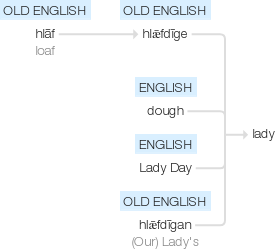Ladies
Old English hlǣfdīge (denoting a woman to whom homage or obedience is due, such as the wife of a lord, also specifically the Virgin Mary), from hlāf ‘loaf’ + a Germanic base meaning ‘knead’, related to dough; compare with lord. In Lady Day and other compounds where it signifies possession, it represents the Old English genitive hlǣfdīgan ‘(Our) Lady's’.
wiktionary
As a lavatory for women, via misspelling of ladies'. Compare gents.
etymonline
ladies (n.)
plural of lady (q.v.). Ladies' night (1880) originally was any event to which women were invited at an all-male club.
Every succeeding occasion is usually said to be "the best ever," but for true pleasure, comfort and genuine enjoyment it is doubtful if any occasion has been more truly "the best ever" than the ladies' night of the Paint, Oil and Varnish Club of Chicago, which was given in the Crystal ballroom of the Blackstone Hotel, Chicago, Thursday evening January 26. ["Paint, Oil and Drug Review," Feb. 1, 1911]
